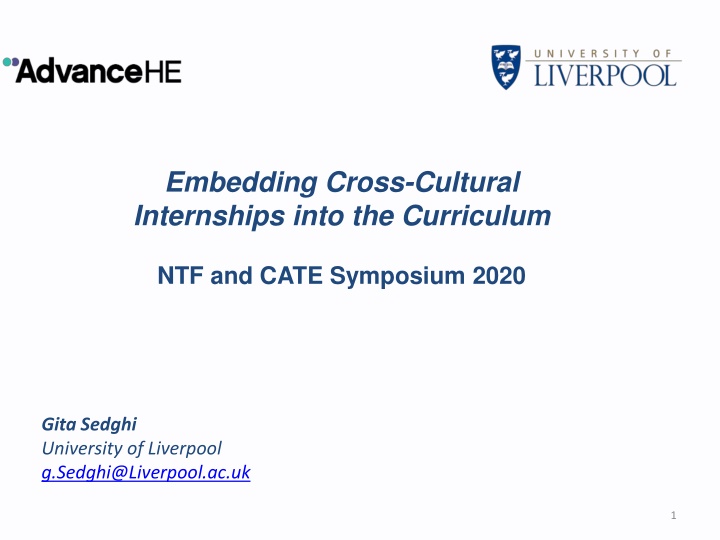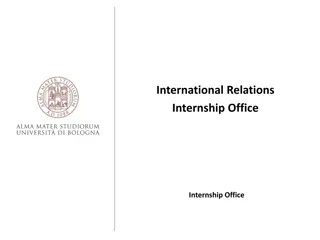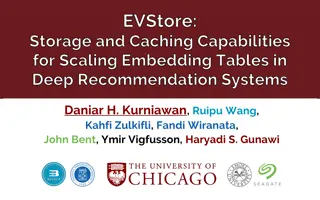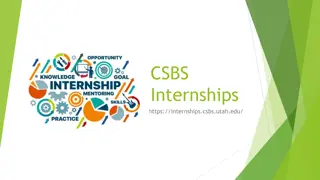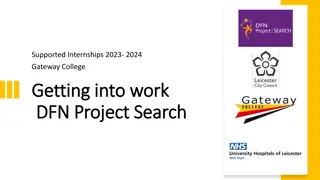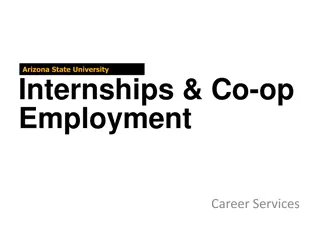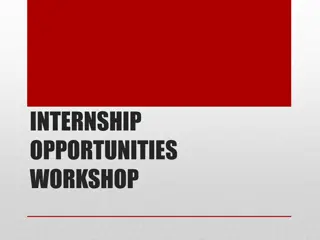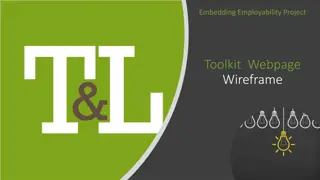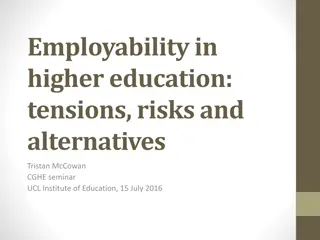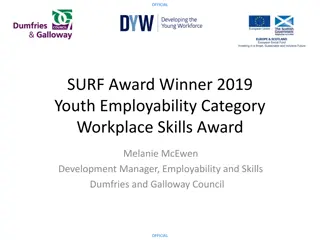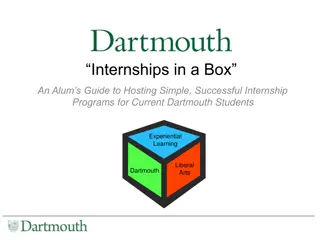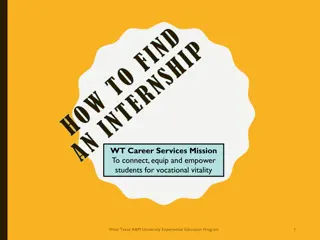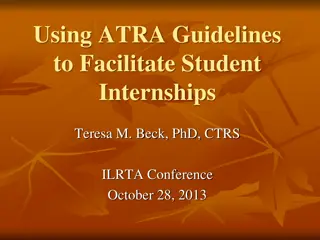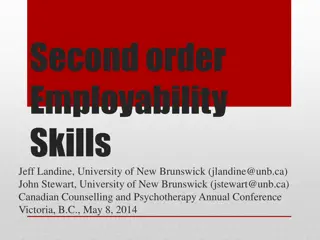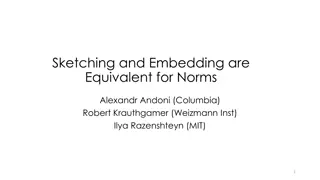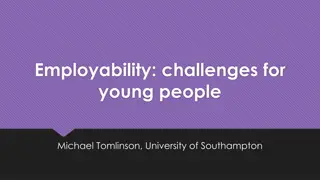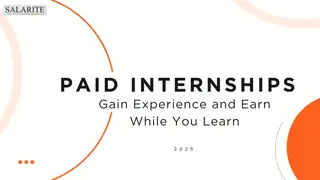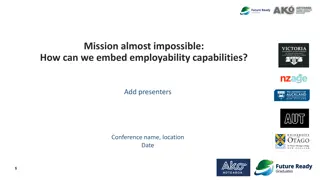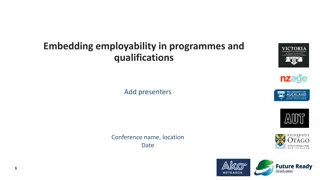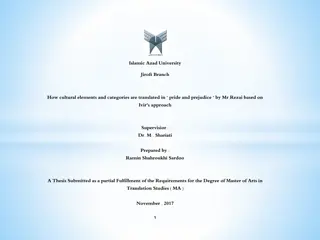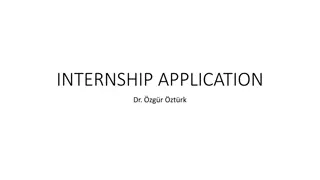Embedding Cross-Cultural Internships for Global Employability
This symposium explores strategies to embed cross-cultural internships into the curriculum at the University of Liverpool, enhancing students' global competencies, employability skills, and cultural awareness through diverse experiences. The research internship module, inclusive international opportunities, and core competencies are highlighted as key elements in preparing students for success in a connected world.
Uploaded on Apr 04, 2025 | 1 Views
Download Presentation

Please find below an Image/Link to download the presentation.
The content on the website is provided AS IS for your information and personal use only. It may not be sold, licensed, or shared on other websites without obtaining consent from the author.If you encounter any issues during the download, it is possible that the publisher has removed the file from their server.
You are allowed to download the files provided on this website for personal or commercial use, subject to the condition that they are used lawfully. All files are the property of their respective owners.
The content on the website is provided AS IS for your information and personal use only. It may not be sold, licensed, or shared on other websites without obtaining consent from the author.
E N D
Presentation Transcript
Embedding Cross-Cultural Internships into the Curriculum NTF and CATE Symposium 2020 Gita Sedghi University of Liverpool g.Sedghi@Liverpool.ac.uk 1
University of Liverpool Education Strategy Our Education Strategy Vision is to support our students as they become creative and culturally rich graduates, with the capacity to find employment that will enable them to be agents for change in a connected world. Opportunities: Increasing the proportion of students who undertake a work placement as part of their curriculum, internship, study abroad opportunity or volunteering experience 2
Definition of Employability Employability is about the capability to move self- sufficiently within the labour market to realise potential through sustainable employment. For the individual, employability depends on the knowledge, skills and attitudes they have, the way they use those assets and present them to employers. Tomlinson, M. & Holmes, L. (2017). Graduate employability in context: theory, research and debate, Palgrave Macmillan, p. 41 63. 3
Core Competencies and Global Competencies Comparison Core Competencies Good communication Global Competencies Work collaboratively with international teams Effective Leadership Enhanced communication skills Planning and research Drive and resilience Teamwork and interpersonal skills Embracing multiple perspectives and challenge thinking Self-management Relevant work experience Lopez-Moreno, C. (2017). The year abroad: understanding the employability skills of the Global Graduate, ERIC, p. 21- 28. 4
Research Internship Module The 22.5 credit module embedded into curriculum is designed to: Provide students with an insight into scientific research and debate in a setting different from the University of Liverpool; Support students to become culturally rich graduates by exposing them to new cultural environments; Develop the confidence to work independently and in a team, to effectively and efficiently attain a scientific goal; Develop students ability to communicate scientific concepts and findings in a variety of formats; Develop students' employability skills. 5
Inclusive international opportunity A different selection criteria from that of Study Abroad; lower risk opportunity for students at different academic levels Various assessment methods to measure both research and soft skills, during and post internships Research opportunity for BSc students Creative assessment method to ensure students reflect on and articulate their gained skills to future employers 6
Teaching Delivery Workshop Six-week placement abroad Tutorial
Assessment After the summer internship During the internship Oral presentation Weekly online reflective portfolio (PebblePad) to set short term goals Research internship report Skills Audit
Reflection on Placement Abroad As part of the final report and presentation students are required to reflect on their personal experiences: Compare University of Liverpool and the internship environment. What were the differences? Has this experience changed the way in which you think about scientific research or your career ambitions? What personal/communication skills have you developed/enhanced? What research skills have you developed/enhanced? Discuss the skills and link them to personal development and future career. 9
Skills Audit PDP Ability to work with others Drive and self-motivation Resilience A capacity to develop new skills and behaviours according to role requirements A high degree of self-reflection and acceptance of criticism An ability to form professional or global networks Adaptability or flexibility Excellent communication skills: both speaking and listening Problem solving or initiative Quick and proactive learner Tolerance for stress Work ethics or professional conduct 10
Outcomes of Skills Audit Students improved their PDP skills gradually over time of the placement. they found the daily and weekly reflection and planning overly difficult in the beginning of the placement. realised their weaknesses in planning, prioritising tasks and reflecting in order to improve the future work. learned to manage their time and to keep motivated by setting short term goals. found themselves natural reflecting on their work midway through the placement. reflected on and/or figured out their future career plans. 11
Skills Audit Ability to work with others When I first arrived at Chula I felt that I had a very good ability to work with others and that I was very confident in speaking to new people and developing friendships. As the weeks went on I realised I had never been in a position before to test these skills This placement has given me the confidence to go home and work with new people which will benefit me in future. Ability to work with others 6 5 4 3 2 1 0 1 2 3 4 5 6 7 8 9 10 11 12 13 14 15 16 17 18 12
Skills Audit Self reflection and acceptance of criticism I learned how to take criticism and improved my self-reflection. These skills will make me a better researcher. I will use criticism in a productive way to make improvements to my work and come out with a higher level of research that will benefit the society. Self-reflection and acceptance of criticism 6 5 4 3 2 1 0 1 2 3 4 5 6 7 8 9 10 11 12 13 14 15 16 17 18 13
Skills Audit Tolerance of stress I have always struggled with my stress in an academic environment which develops into anxiety. This is something I have battled since my A-levels. The last 3 weeks of the project put me into stressful situations which was overwhelming. However, I did manage to push through with support of my peers and the research group so I believe it has improved. I will work on my stress and anxiety and eventually it will not affect my work. Tolerance for stress 6 5 4 3 2 1 0 1 2 3 4 5 6 7 8 9 10 11 12 13 14 15 16 17 18 14
Summary Students developed their employability skills including critical thinking, independent working and communication with people from a different cultural background, in addition to learning new research skills. 30% of Chemistry students experience placement/study abroad. The percentage of internationally mobile BSc students increased from 53% to 84%. The module which was adopted from the Life Sciences and tailored to Chemistry requirements has been disseminated to the Physics Department which shows it can easily be adopted by various disciplines. 15
Thanks for your attention. Any questions? 16
